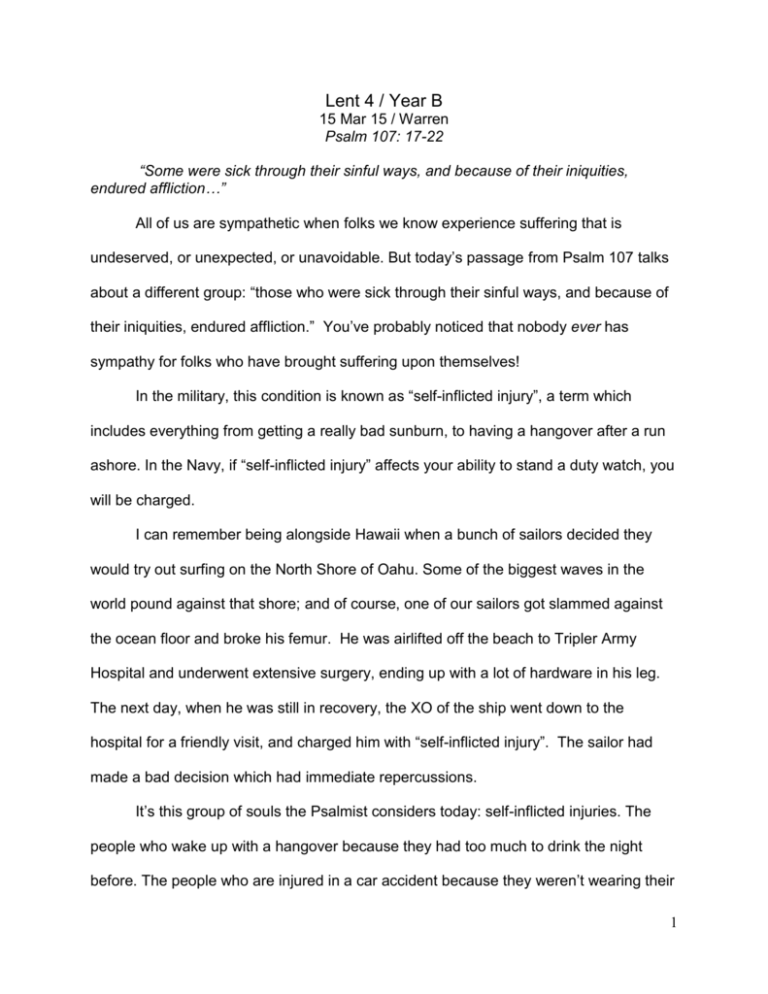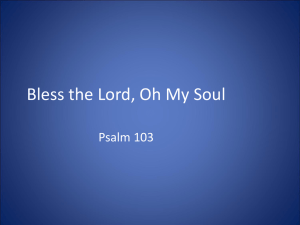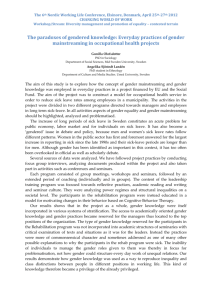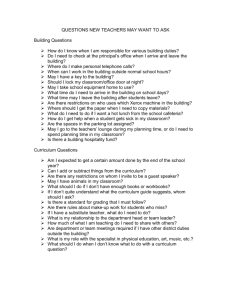Lent 4 / Year B 15 Mar 15 / Warren Psalm 107: 17
advertisement

Lent 4 / Year B 15 Mar 15 / Warren Psalm 107: 17-22 “Some were sick through their sinful ways, and because of their iniquities, endured affliction…” All of us are sympathetic when folks we know experience suffering that is undeserved, or unexpected, or unavoidable. But today’s passage from Psalm 107 talks about a different group: “those who were sick through their sinful ways, and because of their iniquities, endured affliction.” You’ve probably noticed that nobody ever has sympathy for folks who have brought suffering upon themselves! In the military, this condition is known as “self-inflicted injury”, a term which includes everything from getting a really bad sunburn, to having a hangover after a run ashore. In the Navy, if “self-inflicted injury” affects your ability to stand a duty watch, you will be charged. I can remember being alongside Hawaii when a bunch of sailors decided they would try out surfing on the North Shore of Oahu. Some of the biggest waves in the world pound against that shore; and of course, one of our sailors got slammed against the ocean floor and broke his femur. He was airlifted off the beach to Tripler Army Hospital and underwent extensive surgery, ending up with a lot of hardware in his leg. The next day, when he was still in recovery, the XO of the ship went down to the hospital for a friendly visit, and charged him with “self-inflicted injury”. The sailor had made a bad decision which had immediate repercussions. It’s this group of souls the Psalmist considers today: self-inflicted injuries. The people who wake up with a hangover because they had too much to drink the night before. The people who are injured in a car accident because they weren’t wearing their 1 seat belt. The teens who get involved with the wrong crowd and end up in jail. The adults who start smoking pot recreationally, and then one day find themselves selling it to support their habit. When we read these stories in the paper, our reaction is always the same: “they did it to themselves! They deserve what they got.” Though we have never met these folks, and know nothing about their lives, we inevitably judge the choices they made, and we blame them for their own predicaments. As if we have never made a bad decision in our lives, or done anything foolish. Many years ago, I was in a parking lot, backing out of my parking space in a hurry. I had looked left, I had looked right, and the coast was clear. What I had failed to check was the vehicle behind me, in the space directly opposite to me, who had his car in reverse at the same time I did. Wham! I remember being furious with that guy. What was he thinking? Why hadn’t he been more careful? It’s so easy to blame others, isn’t it? Especially folks who seem to have brought trouble upon themselves by their own bad choices. Admittedly, there may be other things at work in their lives like abuse, trauma, bad relationships, depression, guilt or shame, rejection, poor self-care, and addictions. We don’t know, but we are quick to judge; because…, well, because we would never make those bad choices! There was that time when we used that sour cream after the expiry date, and everyone in the house got food poisoning. And there was only one washroom in the house. That was not pretty. 2 And there was that time we got all the way to the airport from Brandon for an international flight, forgot our passport back home, and ended up missing the flight. And had to pay for another full price ticket, the next day. Ouch. And I guess there was that time as a teen when we stole that bottle of Lemon Gin from Dad’s bar, mixed it with Mountain Dew, and got very, very sick. Still – as a rule we don’t make bad choices. Not like those other guys! It’s easy to point the finger, isn’t it? Easy to judge others. “Some were sick through their sinful ways, and because of their iniquities, endured affliction.” Whether we admit it or not, that line pretty much covers all of us. But here’s the gospel. Foolishness does not disqualify anyone from the grace of God. God forgives sinners and fools, and gives them another chance. Psalm 107 goes on to say that even those who have brought trouble upon their own heads will be heard by God; heard and delivered. Now if God does not bring judgement on those who make bad decisions, who are we to do so? Lent should be a time of honest self-examination. It should be a time when we bring less judgement on others, and show generosity of spirit. At the end of the day, we should be glad we have a God who understands stupidity; and loves us even when we make bad decisions. “They cry to the Lord in their trouble, and he saves them from distress.” Good news for sinners and fools. Good news for us. Amen. 3





